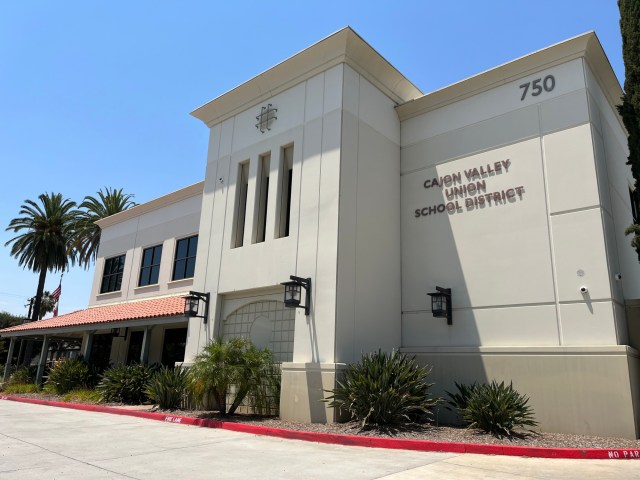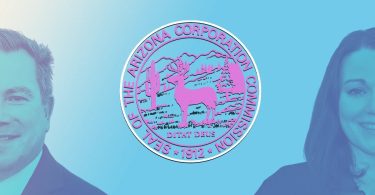Kristen Taketa/The San Diego Union-Tribune
An investigation by the state education department found Cajon Valley Union School District’s sexual health curriculum did not meet state standards.
A state investigation has found that Cajon Valley Union School District’s sexual health curriculum discriminates against LGBTQ+ people because it leaves out legally required instruction about LGBTQ+ and gender topics.
The district’s curriculum also doesn’t address LGBTQ+ people or issues at all.
Cajon Valley is one of a number of school districts in California and nationwide that are being pressured by some groups to eliminate curricula, materials and initiatives that are or could be affiliated with LGBTQ+ topics and people.
Advocates for those changes have said parents should control what their children are taught or not taught about gender and sexuality. Meanwhile LGBTQ+ advocates and allies have called such moves a coordinated discrimination effort under the guise of parents’ rights.
East County’s Cajon Valley school district, which serves about 15,600 students in grades TK-8, teaches sexual health to seventh- and eighth-graders during the spring.
It used to have a curriculum that discussed LGBTQ+ identities and topics, including anti-LGBTQ+ discrimination and mental health.
Then last year some board members objected to the curriculum materials about LGBTQ+ topics. Some trustees suggested the materials were factually inaccurate.
At the time, board President Jim Miller said some materials should be scrubbed “in order to make it more palatable and proper for our community.”
So the board had the district create its own curriculum, which debuted this spring.
The new curriculum violates state law because it leaves out several required components for public schools’ sexual health curriculum, the California Department of Education said in a report released last week. It does not affirmatively recognize that people have different sexual orientations, it does not mention same-sex relationships when discussing examples of relationships and it does not discuss the harms of gender stereotypes.
District leaders told The San Diego Union-Tribune that they believed their curriculum meets state law requirements. But Karen Minshew, its assistant superintendent of educational services, said she and other district leaders will review the curriculum; she said she will also talk with the state to get more clarity on how to become compliant and to review potential curriculum revisions.
“All of our concern is to protect our students and staff from harassment, discrimination and defamation,” Cajon Valley Superintendent David Miyashiro said in an email statement.
Board members who have overseen the development of the new curriculum since last year did not answer requests for comment.
The state department’s investigation was prompted by a complaint filed by Mark Reagles, a district mechanic and president of Cajon Valley’s classified employees union.
Reagles said the board’s move to replace its previous sexual health curriculum is one of many examples of anti-LGBTQ+ discrimination in the district in the past two years. He pointed to the district’s abandonment of its mental health services contract with San Diego Youth Services, its removal of “safe space” posters from classrooms and other incidents.
“I felt I had to do something,” Reagles said about his decision to file the curriculum complaint. “It’s so important to speak up, because if we don’t, then history’s bound to repeat itself.”
‘More palatable and proper’
For four consecutive years, Cajon Valley did not provide comprehensive sexual health education to seventh- and eighth-graders, according to Minshew.
Minshew said the district provided no sexual health education for students during 2020 and 2021 because of pandemic disruptions. It provided none in 2022 because its curriculum at the time was outdated, and by the time it got the updated curriculum, that school year had already passed, she said.
In 2023, the district provided only a piecemeal sexual health education because the school board decided on short notice to abandon the curriculum that Cajon Valley had been using since 2017, without approving a replacement.
The district had been using Positive Prevention Plus, which Cajon Valley has said is a state-approved sexual health curriculum.
At a board meeting in March of last year, at least three board members took issue with some content in that curriculum that discussed LGBTQ+ topics.
Trustee Anthony Carnevale took issue with the fact that the student workbook included external links to websites. Among them were a Human Rights Campaign webpage for information on gender, the Genders & Sexualities Alliances Network website for LGBTQ youth resources and the website of the Gay, Lesbian & Straight Education Network, or GLSEN, for national survey data about LGBTQ+ youths facing discrimination.
Carnevale objected to messages on those websites, including one saying state legislators are attacking LGBTQ+ youth rights and another with a form asking students for their pronouns and preferred names.
“Most of these external website links, the impression I get is, ‘We’re under attack, we’re trying to recruit you.’ It’s not really in keeping with the curriculum,” he said.
Carnevale, who joined the board last year, has repeatedly objected to organizations that he believes have LGBTQ+ affiliations, and he has pushed Cajon Valley and other East County school districts to cut ties with them.
For example, last year both Cajon Valley and Grossmont Union High School District, where Carnevale is a parent, abandoned their contracts for student mental health services with San Diego Youth Services after he objected to the nonprofit’s separate services for LGBTQ+ youths overall in the county.
Trustee Jo Alegria, who has since resigned from the board, also took issue with parts of the Positive Prevention Plus student workbook. She referenced a graphic in the curriculum titled “The Many Dimensions of Human Sexuality” that identified gender identity (represented by a brain), sexual orientation (represented by a heart) and biological sex (represented by male and female symbols) as all being under the umbrella of gender expression.
Alegria thought the graphic “has no scientific basis,” she said. “It’s just, it’s very contradictory, is what I think it is.”
Miller, the board president, asked Minshew whether the district could selectively implement only parts of the curriculum — “in other words, scrubbing things or, you know, lineating things that we disagree with, either philosophically or politically or however we want to phrase it, in order to make it more palatable and proper for our community and our kids out here, versus some other city that would love to dive head first into this.”
Minshew said the district couldn’t cut out a lesson or change the curriculum because of copyright issues.
The board voted to table approval of the Positive Prevention Plus teacher training, despite Minshew’s warning that would likely mean the district would fail to provide that sexual health education for students that year.
“My intention is to try to provide our students with the best opportunity for something that’s not politically charged,” Miller said. “Science, statistics that are formed and based in actual study — alright. Try and tell me that there are 25 different genders … not gonna buy that. I’m not putting that on a third-grader someplace, or a seventh-grader.”
Dennis Nicely, co-chair of GLSEN San Diego, said in an interview he worries a sexual health curriculum that says nothing about LGBTQ+ people will especially hurt Cajon Valley students who are part of the LGBTQ+ community and need such information for the sake of their health.
“They’re not talking about East County values, because East County values are broader than them,” Nicely said of the trustees.
Because the board declined to approve teacher training that would have been needed to implement a curriculum, Minshew looked for a last-minute substitute that teachers could use to teach at least some sexual health education last year.
She ended up pulling some lessons from the district’s 2007 Holt general science curriculum, which she acknowledged were outdated, incomplete and not compliant with state requirements for sexual health education.
“I just went into a science book and looked at the most applicable lessons that might match up with some of the topics. It was not a sexual health curriculum,” Minshew told the Union-Tribune.
‘Appropriate and acceptable for this group’
At a board meeting about a month later, Carnevale announced that a committee would be formed to write a new sexual health curriculum to replace Positive Prevention Plus.
The committee consisted of more than a dozen members, including teachers, parents, school counselors and Trustees Carnevale and Alegria, Minshew said. A consultant, Kirk Melkonian of Educators Cooperative, helped oversee the process. Minshew said no medical professionals were consulted.
The committee met over the course of seven months and provided feedback on the district’s proposed lessons for the new curriculum.
The old Positive Prevention Plus curriculum was 400 pages long and was written by Kim Clark, a retired public health professor at California State University San Bernardino, and Christine Ridley, a registered nurse with a master’s degree in education.
The new district curriculum is about half that long and consists of PowerPoint slides, each with one to a few sentences of instructions for teachers.
The board unanimously approved the new curriculum on March 12. Parents and teachers who led the committee praised the new curriculum, saying it was “based in scientific fact,” aligned with state standards and developed by a collaborative effort.
“The idea here when we’re developing this curriculum is that we’re not replacing parental instruction, we’re not replacing cultural values or expectations about sexual relationships and behavior,” Melkonian said at the March meeting. “There’s a lot of programs … out there on the market, but they’re not designed with the needs of the community first. This was driven by your parents and by your staff to create something that’s really appropriate and acceptable for this group, this community and for the kids that we’re serving.”
The Positive Prevention Plus curriculum had contained an 18-page lesson on gender and sexual orientation that defined several LGBTQ+ terms, including intersex, gender non-conformity and gender binary.
The lesson discussed anti-LGBTQ+ bias and discrimination and their effects. The lesson also said students should learn that it’s just as normal for girls to be assertive and good at sports as it is for boys to be nurses and express emotion, and that there is no one way to express gender roles.
Meanwhile, no part of Cajon Valley’s current sexual education curriculum — including its teacher guides, student handouts and slide presentations — defines, discusses or mentions the terms lesbian, gay, bisexual, transgender or queer, or any related terms or topics.
The one place where it suggests the existence of different sexual orientations is a PowerPoint slide that states nobody should feel unsafe or excluded because of their gender, gender identity, gender expression or sexual orientation, as well as religion, race or ethnicity, nationality and disability.
The note for that slide instructs teachers to “emphasize the idea that regardless of identity everyone deserves to be recognized and respected. The bulleted list represents protected groups by the state of California.”
The state also reprimanded Cajon Valley because there is no evidence that the district’s actual instruction, beyond its written curriculum, teaches about gender, gender identity and gender expression.
Cajon Valley’s current curriculum defines “gender” as “a person’s biological sex, male (XX chromosomes), and female (XY chromosomes).” Minshew said the XX and XY were mismatched due to typographical errors.
Cajon Valley’s equation of gender with “biological sex” differs from the definition agreed upon by major health and medical associations and language authorities, such as the Merriam-Webster dictionary, World Health Organization, National Institutes of Health, American Psychological Association and Associated Press Stylebook. Gender is generally defined as the cultural, social and behavioral constructs and norms typically associated with one sex.
The curriculum materials do not discuss negative gender stereotypes and do not mention same-sex relationships.
Cajon Valley has visual examples of same-sex relationships in the sexual health curriculum that is offered only for students with disabilities, Minshew said. But those examples are not in the district’s sexual health curriculum for general education students.
The state ordered Cajon Valley to show specific evidence, by Jan. 1, that its curricular materials contain the required components they’re now missing.
By March 15, the district must prove teachers have received training in a curriculum that satisfies the state requirements. And by June 30, it must provide evidence that actual instruction contained them.
Cajon Valley can appeal the state department’s investigation report in writing within 30 days of the department’s letter. The district has not said whether it will do so.







